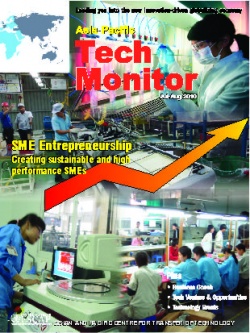
 |
Since 1980s, Viet Nam has allowed the development of private business and SMEs. Starting with some timid reforms in the 1990s in private SMEs development, bolder reform was introduced in 1999 through Enterprise Law. The country has since then experienced a boom in private SMEs. They have now become a strong part of the national economy and have made significant contribution to economic growth, job creation, exports and poverty reduction. SMEs have been mostly driven by entrepreneurs and the quality of growth remains a problem in many aspects. Private SMEs now faced with new development challenge are moving into higher performance, higher productivity and stronger competitiveness. |
Despite some considerable improvement and tremendous progresses in many aspects, the performance of private SMEs is still poorer than FIEs and even SOEs. Modern corporate governance practices, such as those applicable in OECD countries are not yet fully adhered to by Vietnamese private SMEs. In the last 7 years, there is no evidence to show that R&D spending by Viet Namese SMEs has been significantly improved. The SME sector needs to be geared towards a new development phase in which stronger performance, higher productivity, higher value-added and stronger sense of social and environmental responsibility should be seen as the core values.
These issues have been highlighted in an article by an economist of Economica Vietnam on the Asia Pacific Tech Monitor – a Magazine of the Asian Pacific Centre for Technology Transfer (under United Nations ESCAP). Please click here to read the article.
 APEC TATF Country Case Study on Micro Finance in Vietnam (08/05/2012)
APEC TATF Country Case Study on Micro Finance in Vietnam (08/05/2012)
 “Reaching a New Height: Private Enterprises and SMEs Must be the Engine of the National Economy” (08/05/2012)
“Reaching a New Height: Private Enterprises and SMEs Must be the Engine of the National Economy” (08/05/2012)
 Implementation of IFC Business License Reform Project (15/09/2009)
Implementation of IFC Business License Reform Project (15/09/2009)
 Support to the Implementation of Enterprise Law and Investment Law (10/09/2009)
Support to the Implementation of Enterprise Law and Investment Law (10/09/2009)
 Conference on Creating Enabling Business environment in Africa (27/10/2009)
Conference on Creating Enabling Business environment in Africa (27/10/2009)
 Impact Assessment of the Financial Sector Support Programme Loan II (08/05/2012)
Impact Assessment of the Financial Sector Support Programme Loan II (08/05/2012)
 Capacity building for partner associations of UNIDO – MPI SME (09/05/2012)
Capacity building for partner associations of UNIDO – MPI SME (09/05/2012)
 Industrial Policy in Low and Lower Middle Income Countries (23/11/2009)
Industrial Policy in Low and Lower Middle Income Countries (23/11/2009)
 Poverty Reduction through Integrated Enterprise Development (09/05/2009)
Poverty Reduction through Integrated Enterprise Development (09/05/2009)
 Economica experts be part of the MPI’s SME White Book Drafting Team (08/05/2012)
Economica experts be part of the MPI’s SME White Book Drafting Team (08/05/2012)